

Lifestyle Factors and Environmental Causes of Major Depression - Depression Resources, Education About Depression and Unipolar Depression. Lifestyle Factors Physical health is an important foundation of mental health.
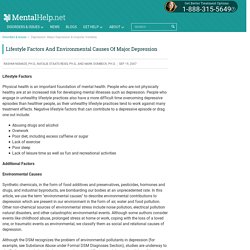
People who are not physically healthy are at an increased risk for developing mental illnesses such as depression. People who engage in unhealthy lifestyle practices also have a more difficult time overcoming depressive episodes than healthier people, as their unhealthy lifestyle practices tend to work against many treatment effects. Negative lifestyle factors that can contribute to a depressive episode or drag one out include: Abusing drugs and alcoholOverworkPoor diet, including excess caffeine or sugar Lack of exercisePoor sleepLack of leisure time as well as fun and recreational activities Additional Factors Environmental Causes.
The boss, not the workload, causes workplace depression. The development of workplace depression has surprisingly little to do with work pressure.
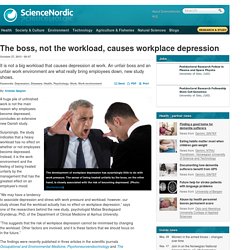
The sense of being treated unfairly by the boss, on the other hand, is closely associated with the risk of becoming depressed. (Photo: Shutterstock) A huge pile of unfinished work is not the main reason why employees become depressed, concludes an extensive new Danish study. Surprisingly, the study indicates that a heavy workload has no effect on whether or not employees become depressed. Instead, it is the work environment and the feeling of being treated unfairly by the management that has the greatest effect on an employee’s mood. Environmental Factors of Depression. According to the National Institute for Mental Health (NIMH), there is no single known cause of depression.
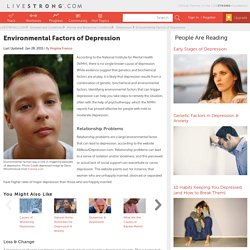
Environmental Factors of Depression. New drug lifts hard-to-treat depression in hours - health - 11 December 2012. Depression need not linger if a new class of drugs that can improve symptoms within hours becomes available.

People with depression are often treated with drugs that increase levels of serotonin and other mood-enhancing chemicals in the brain. But these drugs typically take weeks, or even months, to work. Drugs that target receptors for a chemical called NMDA appear to take effect much faster. Ketamine is one example. When Does Depression Become A Disease? : Neuroskeptic. When does sadness cease to be a normal emotional response, and become a mental disorder?

Can psychiatrists ‘draw the line’ between healthy and sick moods, and if so, where? An important new study offers an answer: When does depression become a disorder? Using recurrence rates to evaluate the validity of proposed changes in major depression diagnostic thresholds (free pdf). The Science and History of Treating Depression. Like Wurtzel, millions of Americans embraced antidepressants.

In 1988, a year after the Food and Drug Administration approved Prozac, 2,469,000 prescriptions for it were dispensed in America. By 2002, that number had risen to 33,320,000. By 2008, antidepressants were the third-most-common prescription drug taken in America. Fast forward to 2012 and the same antidepressants that inspired such enthusiasm have become the new villains of modern psychopharmacology — overhyped, overprescribed chemicals, symptomatic of a pill-happy culture searching for quick fixes for complex mental problems. In “The Emperor’s New Drugs,” the psychologist Irving Kirsch asserted that antidepressants work no better than sugar pills and that the clinical effectiveness of the drugs is, largely, a myth. In fact, the very theory for how these drugs work has been called into question. But this theory has been widely criticized. Is the “serotonin hypothesis” of depression really dead?
Long-Term Depression May Boost Stroke Risk Long After Mood Improves. Medical researchers have known for several years that there is some sort of link between long-term depression and an increased risk of stroke.
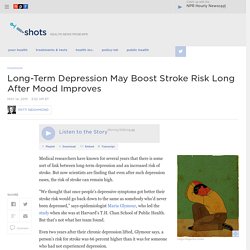
But now scientists are finding that even after such depression eases, the risk of stroke can remain high. "We thought that once people's depressive symptoms got better their stroke risk would go back down to the same as somebody who'd never been depressed," says epidemiologist Maria Glymour, who led the study when she was at Harvard's T.H. Chan School of Public Health. But that's not what her team found. Even two years after their chronic depression lifted, Glymour says, a person's risk for stroke was 66 percent higher than it was for someone who had not experienced depression. The study analyzed data across a dozen years for more than 16,000 adults, age 50 or older. If people answered "yes" to three or more of these questions, the researchers counted them depressed. How to Fight Depression and Anxiety.
What's the best way to deal with depressiona and anxiety?
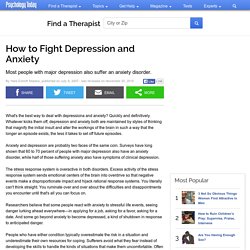
Quickly and definitively. Whatever kicks them off, depression and anxiety both are maintained by styles of thinking that magnify the initial insult and alter the workings of the brain in such a way that the longer an episode exists, the less it takes to set off future episodes. Anxiety and depression are probably two faces of the same coin. "Successfully Depressed" - Josh Whiton - TEDxRaleigh 2010. Low mood and depression - NHS Direct. Most people experience ups and downs in their life, and can feel unhappy, depressed, stressed or anxious during difficult times.
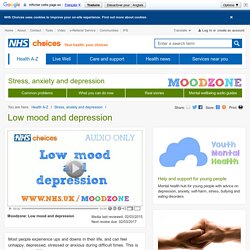
This is a normal part of life. Many difficult events and experiences can leave us in low spirits or cause depression: relationship problems, bereavement, sleep problems, stress at work, bullying, illness, and pain being just a few. Changes to hormones, such as during puberty, after childbirth and during the menopause, can also have an effect on your emotional and mental health. But sometimes it's possible to feel down without there being an obvious reason. What is the difference between low mood and depression? A general low mood can include: sadness an anxious feeling worry tiredness low self-esteem frustration anger However, a low mood will tend to improve after a short time. 50 Sufferers Describe Depression For People Who've Never Been Depressed.
Photo: Leland Francisco I recently posted a question on my Facebook page asking people who'd suffered from depression to describe what it felt like so that those who'd never experienced it could understand it better.

Here were the responses: 1. Depression is seeing no future, and no answer for any of the problems in your life. 2. 3. 4. 5. 6. 7. 8.